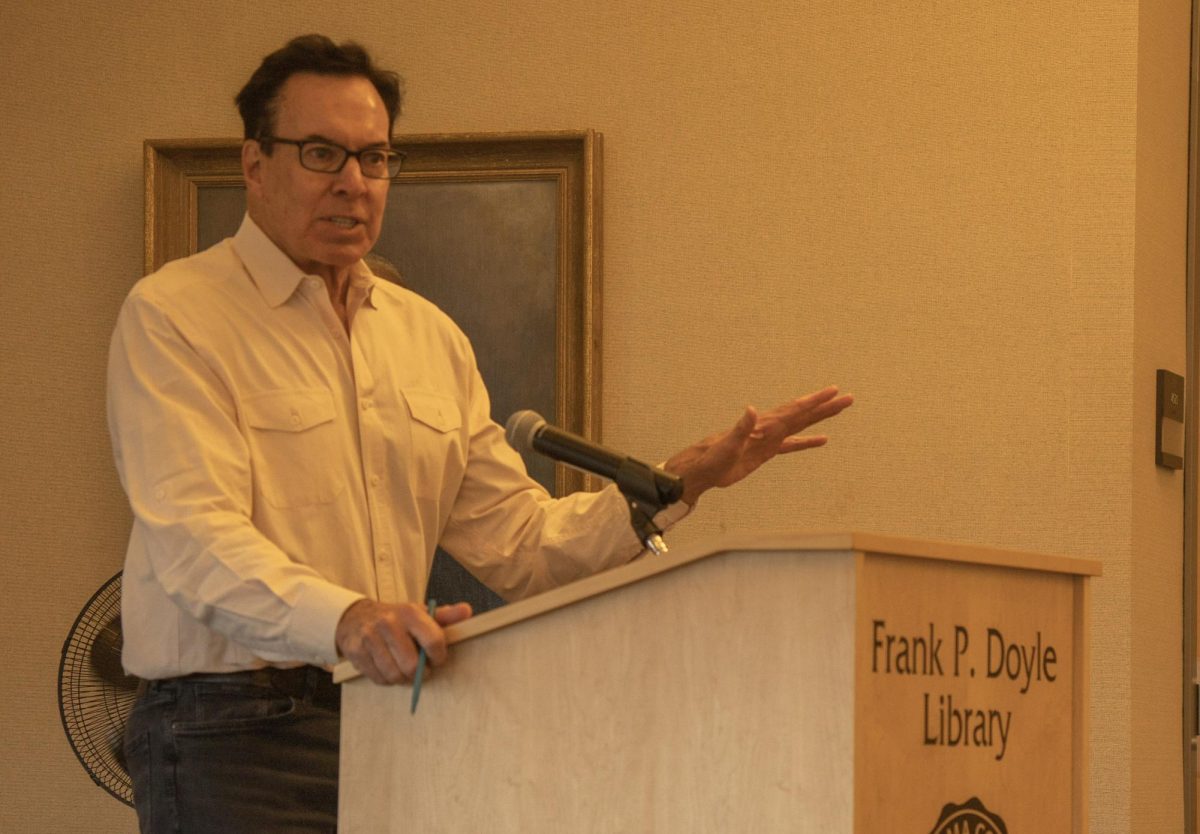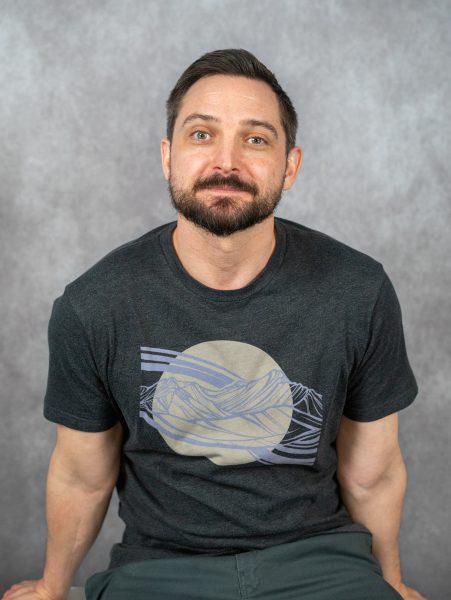Acclaimed author Greg Sarris reminded Santa Rosa Junior College students, staff, faculty and community members that our lives are an interwoven and perpetual story in a reading of his memoir “Becoming Story: A Journey among Seasons, Places, Trees, and Ancestors” at the Doyle Library March 4.
Dozens of attendees listened to Sarris as he spoke about the power stories have to connect humans to each other. With his writing, Sarris said he also hopes to connect readers to the reality of what everything is: this moment.
“We are making stories as we live,” Sarris said. “The story isn’t in the past. As you’re reading it, you’re catching it and it becomes a part of you, just as your experience of walking down the street or being in love.”
Sarris, 72, spent most of his life in Sonoma County, graduating from Santa Rosa High School in 1970. He also attended SRJC before obtaining a bachelor’s degree in English at UCLA, and then a master’s degree in creative writing and a doctorate in modern thought and literature at Stanford University. He has written a variety of works, such as “Grand Avenue,” an award-winning collection of short stories that HBO adapted into a mini-series, and “Watermelon Nights,” which SRJC Theatre Arts adapted for a play in 1999.
In 2000, Sarris co-authored a bill, H.R. 5528, that restored the Federation Coast Miwok as a recognized American Indian Tribe. President Bill Clinton signed it into law. Saris is currently serving his 16th term as chairman of the Federated Indians of Graton Rancheria, previously the Federation Coast Miwok, and has held the Graton Rancheria Endowed Chair in Writing and Native American Studies at Sonoma State University since 2005.
Sarris said he draws much of his inspiration from personal experience mixed with Pomo and Coast Miwok tribe stories, which came from the land. “Before Europeans came here, the landscape was our bible,” he said. The pieces in “Becoming Story” are from his inner monologue arising from this interaction. As such, his writing is a product of collective memory.
“There’s only a myth that there’s an individual,” he said. “There’s no such thing. We’ve never been alone, and what we are comprised of in every way — including memory, including what’s in our blood, including the air we’re breathing — is connected to everything else. One of the things I’ve always tried to do as a writer was to negotiate with who I am today and my identity with the old stories I’ve heard.”
He began by reading “Frost” from the first section of “Becoming Story,” which challenges the interconnection of time and his childhood memory:
“I see in that chance meeting of an adopted boy and a one-armed housepainter the miraculous web that is all of time, nothing more, nothing less all-inclusive. But it’s memory that prevails still. Memory trounces this miraculous web – that is, if memory is not the vantage point from which I gaze upon it.”
The story centers around Sarris’ pet cow, Harry, with whom he forms a bond without knowing that Harry is destined to become beef, a fate only alluded to.
This reading sparked the toughest question Sarris has had to answer about his writing when a child attendee asked him what happened to Harry. After a little fidgeting Sarris eventually turned it back to the child and asked, “What do you believe?” The child answered correctly, “that maybe they were going to use him for meat.” Looking relieved, Sarris finished the exchange. “You got it.”
Sarris believes the message of connection in Native American stories is vital if the human race is going to survive the onslaught of continued environmental degradation and climate change.
A recent trend in literature is to focus on personal trauma. While this is important to recognize, it’s time to focus on healing, Sarris said.
“If we don’t do something and start thinking differently, in 10 years or 20 years, our little pains are going to look like a tea party in a hailstorm. The Earth is the equalizer,” Sarris said.
Sarris believes a lot of the troubles humans face come from listening to stories that disconnect us, even when they make us feel connected, such as those of Genesis and Exodus.
“You get released from slavery, you go to the desert and God tells you you’re a chosen people, and you’re owed land,” Sarris said. “Right there, the idea that you’re owed something and chosen, no matter who you are, is problematic. And then the Christians did it, and then the Muslims did it, and then the colonizers came here and did it.”
Sarris said this worked on both sides. It’s understandable why the indigenous people would resist colonization and protect themselves, but over time they have locked themselves into an “us versus them” instead of a “we” mentality.
Believing in disconnecting narratives is also not limited to religion, Sarris said. Even environmentalists tend to get stuck into thinking that an invasive species is the singular cause of certain ecosystem degradation, and eliminating it will solve everything.
Sarris pointed to media, particularly celebrity culture, as another deterrent to healing, because it’s distracting and takes us out of the moment. He covered this theme in another piece from “Becoming Story,” called “If Oprah Were an Oak Tree,” in which he speculates how much the health of Sonoma County’s oak trees would improve if we paid attention to them as much as celebrities.
“We idolize Oprah, we idolize Taylor Swift. Meanwhile, the trees of the land that’s going to keep us alive, we’re ignoring,” he said.
Sarris also read from his new novel, “The Forgetters,” releasing this April. The story he shared was about a young boy who learns he has the power to open up the clouds and create a huge windstorm that lasts for days and disrupts the lives of white settlers and indigenous villagers alike. Eventually the boy’s mother stops him and takes him away from the village. The boy stays away from the village until he is a man and doesn’t acknowledge that he was the one who caused the windstorm.
The point of the story, Sarris said, was a warning against thinking you’re too smart. The boy gets carried away with his new powers and ends up having to leave the village. Human intelligence is just something that gives us our place in Native American lore, rather than giving us the right to rule over everything.
“We can’t run as fast as the deer, [we] are not as strong as the bear,” he said. “We can’t fly as high, but we’re left here to remember their power. And that we’re just a part of this, and if we forget, we are lost. All these stories keep reminding us, you see. It’s the antithesis of the bible.”
Sarris said a common trend of white settlers was to focus on how irrational these stories sounded when the point was the moral behind it.
“There are things like that that happened, which people want to say supernatural or natural,” Sarris said. “But in my way of thinking there is no natural or supernatural, it’s all one. And as Mable Mckay [a person often referenced in Becoming Story] used to say, ‘There’s no such thing as imagination. Whether you believe it or not, it’s true.’”
Alongside his readings, Sarris asked attendees to be mindful of where their food and water come from.
“You know how people pray before dinner. They thank God for all this stuff,” Sarris said. “Well, let’s track it back. What about the vegetables? Where were they grown? Who packed and harvested those vegetables, and were they sprayed with anything. That’s God. That’s being in touch with God. All religions, I don’t care what you are, that’s God.”
Sarris said we forget the humanity of farm workers, that they love their families and want to be safe like the rest of us. So he asked that people shop responsibly, as much as possible.
He finished his lecture by asking attendees not to give in to the fearmongering and paranoia that is perpetuated by TV and our nation’s current politicians.
“Have the courage to not be scared, and the world will come,” Sarris said. “All of this bad news can rob you of the beauty of the moment. Say ‘hell with it.’ You know, every time I get tired or start despairing, a hummingbird will come to my window, and it’s saying ‘Listen, I’m out here doing my thing. Get off your ass.’”





Judith Vaughn • Mar 15, 2024 at 1:16 pm
A really profound message from he who understands the power of connection between all beings. Thank you. Judith